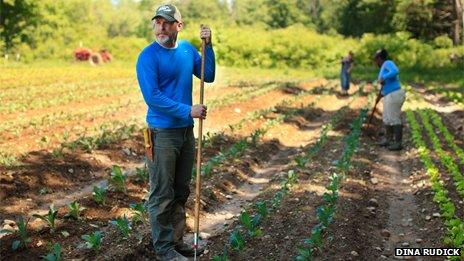The US professionals quitting the rat race to become farmers
- Published

Farming has always been a hard way to make a living.
Now, a small but - anecdotally - growing group of Americans are leaving the structure and security of an office job for the gruelling, yet rewarding work of earning money from the land.
Some want to be a part of improving the food supply for themselves and their community; others are excited by the prospect of becoming self-sufficient, or simply working outdoors like their ancestors did.
There are no good statistics yet on how many people are moving from desk jobs to field work, but Kimberley Hart, Karen Sommerlad and Erik Jacobs have all made the transition.
Ms Hart gave up making costumes for Broadway productions to grow vegetables on a modest rented farm in upstate New York, while Mr Jacobs left behind his career as a Boston-based freelance news photographer to study as an apprentice farmer.
Meanwhile, Ms Sommerlad left a campus planning post at Harvard University to grow everything "from arugula [rocket] to zucchini [courgettes]".
The trend seems most noticeable in the north-eastern United States - where all three live - as well as in California, possibly because of the flourishing "eat local" movements and growth of farmers' markets in both areas.
'Viable career'
In the US, there are now 456,000 "beginning farmers", defined by the government as those with less than a decade's experience.
According to the US Department of Agriculture, they are less likely than established farmers to receive government subsidies, and more likely to be college educated and have jobs off the farm.
They also earn less from farming, and work smaller farms - though they aren't necessarily younger than their more established peers.
Although official statistics have yet to show an increase in the number of these novice farmers, there is plenty of anecdotal evidence. There are now more than 8,000 farmers' markets across the US, a 38% increase in five years, and up from a few hundred a generation ago.
At the Farm School in Athol, Massachusetts, demand for its year-long learn-to-farm programme has jumped from 15-20 applicants five years ago to nearly 50 this year, according to farm director Patrick Connors.
He says the Farm School's programme "grew out of this recognition that more and more people were looking to build these [farming] skills".
"This has become a viable career," adds Mr Connors. "There's lots of people in New England and California who run successful small businesses on their farms. As it's become a more viable profession, I think more people are considering it."
Pupils on last year's class at Farm School ranged in age from 19 to 53. Incoming students this autumn include a lawyer, a doctor, a teacher, and several business executives.
Second jobs
While no-one is getting rich running a small-scale farm, for Ms Sommerlad and her husband, David Cobb, it supplements their retirement earnings.
"We really do it because we love growing food and connecting with the community," says Ms Sommerlad. "The income is secondary."
For Ms Hart, her goal for this year is to make a modest $10,000 (£6,400) profit. "Even if we totally mess up, we should be able to make that," she says.
Yet virtually all small farmers - both the new and the experienced - supplement their crop earnings, sometimes with added-value products like making cheese from their cows' milk.
Often one partner will continue to have a non-farming job in the city, while the other manages the farm full-time.
Ms Hart and her husband, Thad Simerly, have this arrangement. He still commutes to New York City for his job in plaster restoration, where he earns far more than they could ever make on the farm.
At the Farm School, many graduates use their former careers as a way to supplement their agricultural earnings.
Mr Jacobs will continue to take photos for editorial clients, as well as recording his farming experiences on his website.
He plans to work as a salaried farmer this year, while his wife continues her job as a staff photographer at the Boston Globe. The two had their first child, a boy, in May.
'Fickle market'
Another thing new farmers learn early - it often makes more sense to lease their acreage than fulfil their fantasy of owning the land themselves.
Ms Hart leases her land, and Mr Jacobs is about to, now he has finished his programme at the Farm School.
Mr Jacobs says renting instead of owning land will allow him to be free of burdensome debt that he worried would turn working the land into just another job.
Ms Sommerlad and her husband own their land, but instead of buying an expensive field, they grow high-value vegetables for restaurants and farmers' markets on just half an acre of their back yard in Sudbury, Vermont.
"It's kind of a fickle market, so we decided to stick with what we know we can grow," says Ms Sommerlad.
"We worked it out so that if we make money that's terrific. If we don't then we're not going to go hungry. We'll still have a roof over our head."
All three novices agree that the joy of farming vastly outweighs its low financial returns - at least so far.
Ms Hart says her goal was to be self-sufficient and sustainable.
And because she and her husband wanted an escape. "We wanted to make our living from farming to extricate ourselves from the city," she says.
Mr Jacobs says: "One of the ways I keep from despairing [about the world] is doing this farming thing. There's a lot of peace in reducing my footprint and living my values."